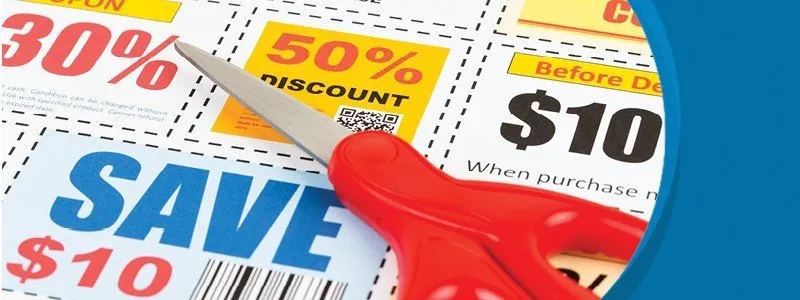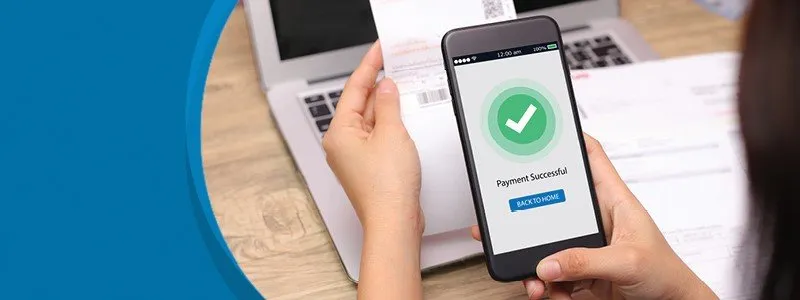
[ad_1]

Have you been feeling the pinch of inflation at the grocery store, gas pump, or while shopping for the holidays? Simply put, inflation means that too much money is chasing a limited supply of goods and services. For example, supply chain issues around computer chips, wiring harnesses and other components resulted in 7.7 million fewer vehicles being produced in 2021. Consumer demand means more people are trying to purchase fewer vehicles resulting in the prices increasing (or inflating).
While a modest amount of annual inflation is good because it means the economy is growing, too much too fast puts a strain on everyone. In this article, we’ll look at incremental ways to adjust for inflation so you can find little savings that add up to something bigger.
 Make a budget
Make a budget
You can’t find ways to save money if you don’t know where your hard-earned dollars are currently going. Making a budget is a great first step toward improving your financial health.
The first step is to write down your total monthly take-home pay. This is the pot of money you’re working with. Next, list your essential bills and expenses. For example, your rent or mortgage, utilities, and groceries. Debt payments are also essential. Internet and cell phone bills can also be considered essential, especially if you work from home, but cable or streaming services would not fall into the essential category.
Add up the total of your essential bills and expenses. Subtract that from your monthly pot of money. The amount left over is your discretionary spending. This is where things like app subscriptions, gym memberships, cable or streaming, eating out, travel, concerts, etc. fall into. It’s also the bucket of money from which you can increase your contributions to savings accounts or pay extra toward debt you want to eliminate.
We’re not saying you should cut everything fun in your life. But budgeting helps you understand that money management is all about choices. If you need to spend more on groceries or gas, for example, you can cut the discretionary spending that is the lowest priority for you. You may even be spending on things you don’t really care about without realizing it. Those small cuts in spending will add up to something bigger where it counts.
 Cut the cord or downgrade your streaming services
Cut the cord or downgrade your streaming services
57% of U.S. households have traditional cable TV packages, according to a recent report. The average monthly cost of cable (including fees and box rentals) is $217.42. So, if you are a cable TV subscriber, cutting the cord may be one of your biggest opportunities to cut spending and save money in your current budget.
If you subscribe to streaming services, make a list of your current subscriptions. At $15/month or so, multiple streaming subscriptions can add up quickly. Get rid of anything you don’t use that often. Also, Netflix and Disney recently announced ad-supported subscription plans. If you’re willing to watch a few ads with your entertainment, you could save up to $15 a month or almost $200 a year.
 Eat more veggies.
Eat more veggies.
The price of ground beef has seen a year over year price increase of about 10%. Meanwhile, fresh vegetable prices are predicted to increase only between 4.5 and 5.5 percent in 2022. Pasta and rice prices have barely increased year over year. Swapping a beef-based dinner or two each week with one that uses more veggies and pasta will result in a noticeable savings at the grocery store each month. It could also benefit your health! If you’re not sure where to start, search for “easy vegetarian recipes” or “simple plant-based recipes” and you’re sure to find many options.
 Get a library card
Get a library card
Consider canceling your streaming services all together and get a library card instead. A library card is free to register for and many libraries now include DVD rentals, streaming services and audio books. Of course, you can also check out books for free from your local library. Avid readers who tend to purchase books can realize savings from using the library instead. Some libraries also allow patrons to check out museum and other passes for free, giving you an affordable outing option. Check with your local library to see what they offer. Here are some libraries in Northern Vermont and Northern New Hampshire that offer streaming services:
- Kellogg-Hubbard Library: Offers TV and movie streaming through Kanopy, as well as eBooks, audiobooks, and magazines through Libby.
- Cobleigh Public Library: Offers TV and movie streaming through Kanopy, as well as eBooks, audiobooks, and magazines through Libby.
- Pierson Library: Offers TV and movie streaming through Kanopy, as well as eBooks, audiobooks, and magazines through Libby.
- St. Albans Free Library: Offers TV and movie streaming through Kanopy and hoopla, as well as eBooks and audiobooks through The Palace Project.
- St. Johnsbury Athenaeum: Offers TV and movie streaming through Kanopy, as well as eBooks and audiobooks through The Palace Project.
- Dorothy Alling Memorial Library: Offers TV and movie streaming through hoopla, as well as eBooks and audiobooks through Libby.
- Littleton Public Library: Offers TV and movie streaming through hoopla, as well as eBooks and audiobooks through Libby.
 Cancel your gym membership
Cancel your gym membership
Do you use it enough to get your money’s worth? Could you exercise at home or outside instead? Vermont and New Hampshire are renowned for their outdoor activities in all seasons. There are endless options for hiking, walking, biking, and skiing. YouTube offers free yoga and other workout routines to do at home. If you do love going to the gym, perhaps you could save money by switching to a more affordable option like Planet Fitness.
 Barter
Barter
If you have a talent, skill, or ability that others may find useful, consider offering your services in exchange for theirs. There are even websites to connect you with other people interested in bartering.
Parents looking to save on childcare costs could share a babysitter with another family or take turns watching each other’s kid(s) for a date night outing.
 Coupon and rebate apps
Coupon and rebate apps
Coupon clipping has also gone digital with apps and plugins that help you find coupon codes and get the best price on your online purchases. Check out this list of the best rebate and cash back apps. Popular coupon plugins include Honey and Rakuten.
 Vacation nearby
Vacation nearby
Planning your next vacation? The average cost of a plane ticket has risen over 25% in the last year. That means the average ticket could cost you $100 more then it was just a few years ago. Luckily, Vermont and New Hampshire have lots of great vacation options within driving distance. Vacation on Lake Champlain or Lake Winnipesaukee, bring the family to Smugglers’ Notch Resort, go camping in one of our state parks, or drive to the Atlantic Coast beaches in Maine. Find a charming bed and breakfast to stay in, take the kids to a water or theme park, or treat yourself to a spa day.
 Switch service providers
Switch service providers
Cell phone, Internet and cable, and car insurance companies are notorious for raising the prices of long-time customers. You may also no longer need your current package or, in the case of car insurance, you may be driving less than you used to. Many companies offer discounted services for new customers or would be happy to beat your current pricing. Take the time to shop around for new service providers. If you are a homeowner and don’t already bundle home and auto insurance, this is another area of possible savings.
 Plan Ahead
Plan Ahead
Sometimes getting a discount is about exercising qualities like flexibility and patience. For example, some car manufacturers will actually give you a discount if you factory order a vehicle. You just have to be prepared to wait for your new vehicle for up to 12 months. If you plan to purchase a new vehicle and are able to wait, this could be a great way to save some money.
Save your money in high interest, government-insured accounts
The upside to rising rates is a higher interest rate on your savings account. Now is a great time to open a Certificate of Deposit (CD). Check out our current rates and look out for specials!
If you tend to maintain a higher average account balance anyway, put your money to work for you with a Money Market Account (MMA), a hybrid checking-savings account with a tiered interest rate to reward you for a higher balance.
A trusted member of your community since 1891!
At Union Bank, we are dedicated to meeting your individual banking needs. With inflation throwing a wrench in your budget, we are here to help you adjust. To discuss your financial goals and challenges, contact us at 800.753.4343, or visit one of our branch locations in Northern Vermont and Northern New Hampshire.
[ad_2]
 Make a budget
Make a budget Cut the cord or downgrade your streaming services
Cut the cord or downgrade your streaming services Eat more veggies.
Eat more veggies. Get a library card
Get a library card Cancel your gym membership
Cancel your gym membership Barter
Barter Coupon and rebate apps
Coupon and rebate apps Vacation nearby
Vacation nearby Switch service providers
Switch service providers Plan Ahead
Plan Ahead






